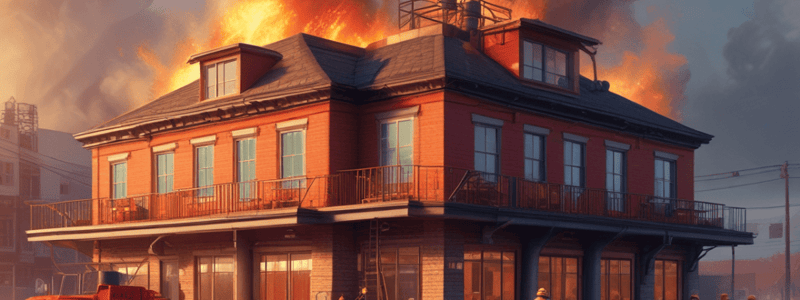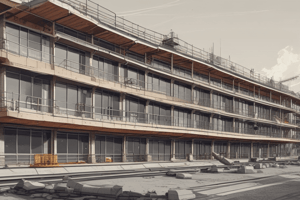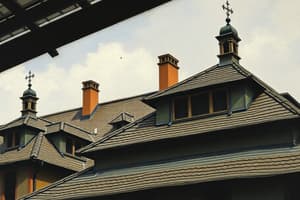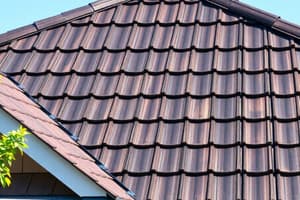Podcast
Questions and Answers
What type of roofs are the easiest for firefighters to work on?
What type of roofs are the easiest for firefighters to work on?
- Inverted roofs
- Curved roofs
- Pitched roofs
- Flat roofs (correct)
Which type of roof can provide a false sense of security for firefighters?
Which type of roof can provide a false sense of security for firefighters?
- Pitched roofs
- Curved roofs
- Geodesic domes
- Flat roofs (correct)
What material is NOT typically used in constructing geodesic domes?
What material is NOT typically used in constructing geodesic domes?
- Steel (correct)
- Bamboo
- Concrete
- Plywood
Which type of roof support system may have inverted trusses?
Which type of roof support system may have inverted trusses?
Which roofing system is becoming less common due to requiring higher knowledge and skills, costly materials, and more construction time?
Which roofing system is becoming less common due to requiring higher knowledge and skills, costly materials, and more construction time?
What is the purpose of a Ridgepole Collar Tie in a roof framing system?
What is the purpose of a Ridgepole Collar Tie in a roof framing system?
In what scenario would the failure of any single element of a bowstring truss lead to catastrophic failure?
In what scenario would the failure of any single element of a bowstring truss lead to catastrophic failure?
What is the primary purpose of a steel tie rod in an arch-supported roof?
What is the primary purpose of a steel tie rod in an arch-supported roof?
Which material is commonly used in the construction of roof decks due to its nailability?
Which material is commonly used in the construction of roof decks due to its nailability?
What is one of the conditions roofing materials must resist as mentioned in the text?
What is one of the conditions roofing materials must resist as mentioned in the text?
What material are rafters commonly made of in contemporary commercial construction?
What material are rafters commonly made of in contemporary commercial construction?
What is the typical spacing range for wood rafters in construction?
What is the typical spacing range for wood rafters in construction?
What is the main difference between an inverted truss and a standard truss design?
What is the main difference between an inverted truss and a standard truss design?
What is the function of a ridge board in roof framing?
What is the function of a ridge board in roof framing?
How does pre-engineered roof framing compare to beams or joists in terms of material usage?
How does pre-engineered roof framing compare to beams or joists in terms of material usage?
Why are new roofing materials sometimes added over an existing roof?
Why are new roofing materials sometimes added over an existing roof?
What is a common issue associated with layered roofs due to the extra thickness of roofing materials?
What is a common issue associated with layered roofs due to the extra thickness of roofing materials?
Which material is commonly used as a drainage layer for built-up roofing systems?
Which material is commonly used as a drainage layer for built-up roofing systems?
Why are wood shingles and shakes made from red cedar, white cedar, or redwood?
Why are wood shingles and shakes made from red cedar, white cedar, or redwood?
What is the purpose of installing underlayment before applying asphalt shingles on a roof?
What is the purpose of installing underlayment before applying asphalt shingles on a roof?
What is a disadvantage of wood shingles and shakes in terms of fire resistance?
What is a disadvantage of wood shingles and shakes in terms of fire resistance?
How do clay, slate, and cement tiles differ from wood shingles in terms of fire resistance?
How do clay, slate, and cement tiles differ from wood shingles in terms of fire resistance?
What is one way to avoid galvanic corrosion in metal roof coverings?
What is one way to avoid galvanic corrosion in metal roof coverings?
What could be a consequence of painting or staining wood shingles or shakes with oil-based materials?
What could be a consequence of painting or staining wood shingles or shakes with oil-based materials?
In the installation of slate roofing, how should the nail be positioned for proper installation?
In the installation of slate roofing, how should the nail be positioned for proper installation?
What is the purpose of roofing felt in flat metal roofing systems?
What is the purpose of roofing felt in flat metal roofing systems?
Why can firefighting on roofs with two separate layers pose challenges?
Why can firefighting on roofs with two separate layers pose challenges?
What is a potential hazard associated with green design roofs?
What is a potential hazard associated with green design roofs?
Why should photovoltaic cells be handled with care during fireground operations?
Why should photovoltaic cells be handled with care during fireground operations?
What is a key benefit of green roofs according to the text?
What is a key benefit of green roofs according to the text?
What is a primary hazard associated with vegetative roofs if the vegetation is not properly taken care of?
What is a primary hazard associated with vegetative roofs if the vegetation is not properly taken care of?
What is the primary purpose of penthouses constructed on the main roof of a building?
What is the primary purpose of penthouses constructed on the main roof of a building?
What is the main function of skylights in a building?
What is the main function of skylights in a building?
Why are roof openings typically provided in buildings?
Why are roof openings typically provided in buildings?
What is a key consideration for skylights as per building codes?
What is a key consideration for skylights as per building codes?
In what situations might skylights be equipped with photovoltaic strips?
In what situations might skylights be equipped with photovoltaic strips?
Why must firefighters sometimes locate a route to access a roof in certain buildings?
Why must firefighters sometimes locate a route to access a roof in certain buildings?
What can skylights be equipped with to allow for normal building ventilation?
What can skylights be equipped with to allow for normal building ventilation?
What is the purpose of penthouses constructed on building roofs that contain stairwells?
What is the purpose of penthouses constructed on building roofs that contain stairwells?
In what situation would firefighters resort to breaking or prying skylights during an emergency?
In what situation would firefighters resort to breaking or prying skylights during an emergency?
What is the primary purpose of a ridge board in roof framing?
What is the primary purpose of a ridge board in roof framing?
What is the key characteristic that differentiates an inverted truss from a standard truss design?
What is the key characteristic that differentiates an inverted truss from a standard truss design?
Why are Pre-engineered roof trusses favored over beams or joists in construction?
Why are Pre-engineered roof trusses favored over beams or joists in construction?
If wood rafters are spaced 18 inches apart in construction, what could this spacing indicate about the span and load?
If wood rafters are spaced 18 inches apart in construction, what could this spacing indicate about the span and load?
In what way does an inverted truss challenge traditional truss designs in terms of structural compression?
In what way does an inverted truss challenge traditional truss designs in terms of structural compression?
Given the purpose of Ridgepole Collar Tie in a roof framing system, where is this member typically located?
Given the purpose of Ridgepole Collar Tie in a roof framing system, where is this member typically located?
What is a distinguishing feature of bowstring trusses that contributes to their structural stability?
What is a distinguishing feature of bowstring trusses that contributes to their structural stability?
Which material is commonly used to fabricate roof trusses and is found in both steel and wood options?
Which material is commonly used to fabricate roof trusses and is found in both steel and wood options?
What is a key factor that influences the choice of roof covering material?
What is a key factor that influences the choice of roof covering material?
Which type of roof decking material is known for its nailability and is frequently used due to this characteristic?
Which type of roof decking material is known for its nailability and is frequently used due to this characteristic?
What is the primary purpose of adding new roofing materials over an existing roof?
What is the primary purpose of adding new roofing materials over an existing roof?
Which factor influences the choice of roof covering due to its ability to minimize the possibility of water pooling on a pitched roof?
Which factor influences the choice of roof covering due to its ability to minimize the possibility of water pooling on a pitched roof?
In flat roof coverings, what component is responsible for reducing heat loss through the roof?
In flat roof coverings, what component is responsible for reducing heat loss through the roof?
Which type of roofing membrane is made of several overlapping layers of roofing felt, saturated with a bituminous material?
Which type of roofing membrane is made of several overlapping layers of roofing felt, saturated with a bituminous material?
What component in flat roofs allows for the free movement of rainwater to the roof drains?
What component in flat roofs allows for the free movement of rainwater to the roof drains?
What is a key consideration for firefighters when working on pitched roofs with steep roof pitches?
What is a key consideration for firefighters when working on pitched roofs with steep roof pitches?
What potential danger do flat roofs pose for firefighters?
What potential danger do flat roofs pose for firefighters?
What is the primary difference between flat roofs and pitched roofs that may affect how firefighters interact with them?
What is the primary difference between flat roofs and pitched roofs that may affect how firefighters interact with them?
Which type of roof support system uses inverted trusses, differing from conventional roof structures?
Which type of roof support system uses inverted trusses, differing from conventional roof structures?
What should firefighters be cautious about when working on flat roofs to avoid misinterpreting the situation?
What should firefighters be cautious about when working on flat roofs to avoid misinterpreting the situation?
What is a key advantage of clay, slate, and cement tiles over wood shingles and shakes in terms of fire resistance?
What is a key advantage of clay, slate, and cement tiles over wood shingles and shakes in terms of fire resistance?
Which material is NOT commonly used for metal roof coverings as mentioned in the text?
Which material is NOT commonly used for metal roof coverings as mentioned in the text?
What issue may arise if wood shingles or shakes are painted or stained with oil-based materials?
What issue may arise if wood shingles or shakes are painted or stained with oil-based materials?
What is the main cause of galvanic corrosion in metal roof coverings?
What is the main cause of galvanic corrosion in metal roof coverings?
How does slate roofing differ from wood shingles in terms of potential longevity?
How does slate roofing differ from wood shingles in terms of potential longevity?
What is the purpose of seams in individual flat metal roofing sheets?
What is the purpose of seams in individual flat metal roofing sheets?
How do green design roofs impact ventilation practices and indicators of fire location and spread?
How do green design roofs impact ventilation practices and indicators of fire location and spread?
Why should photovoltaic cells be handled with care during fireground operations?
Why should photovoltaic cells be handled with care during fireground operations?
What is a significant hazard associated with photovoltaic systems on flat roofs?
What is a significant hazard associated with photovoltaic systems on flat roofs?
How do vegetative green roofs affect the insulation of a building?
How do vegetative green roofs affect the insulation of a building?
What is a primary consideration when firefighters need to access a roof from inside a building?
What is a primary consideration when firefighters need to access a roof from inside a building?
What is the primary function of skylights according to the information provided?
What is the primary function of skylights according to the information provided?
In what situation might firefighters use roof openings during fire fighting?
In what situation might firefighters use roof openings during fire fighting?
What hazard might arise if vegetative roofs lack proper hydration?
What hazard might arise if vegetative roofs lack proper hydration?
What is a common material used in the construction of skylights?
What is a common material used in the construction of skylights?
Why might penthouses be constructed on building roofs according to the text?
Why might penthouses be constructed on building roofs according to the text?
What is one impact of green roofs being constructed with a layer of earth and growing plants?
What is one impact of green roofs being constructed with a layer of earth and growing plants?
How do skylights typically facilitate building ventilation?
How do skylights typically facilitate building ventilation?
What is an essential feature of some skylights that allows for electronic operation?
What is an essential feature of some skylights that allows for electronic operation?
Why might skylight housing need to be pushed aside in an emergency?
Why might skylight housing need to be pushed aside in an emergency?
Flashcards are hidden until you start studying
Study Notes
Roofs and Fire Fighting
- A roof is a waterproof covering for a building that plays a crucial role in structural fire fighting.
- Firefighters must be familiar with roof construction, including the use of a roof to support ventilation equipment.
Safety Points Regarding Roofs
- Roofs are usually not as strong as floors.
- Roofs may have concealed spaces.
- Roofs are subject to wear and deterioration.
Types of Roofs
- Flat Roofs: Found on various types of buildings, provided with a slight slope for drainage, and are the easiest roofs for firefighters to work on.
- Pitched Roofs: Designed to shed water and snow, have a slope that presents a major hazard to firefighters, and can be categorized into low slope roofs and medium to high slope roofs.
- Curved Roofs: Include geodesic domes, which are created using spherical triangulation.
Roof Support Systems
- Flat Roof Support: May use open-web steel joists and steel beams, or ordinary wood joists supported at either end by load-bearing walls.
- Pitched Roof Support: Uses inclined members to support pitched roofs, built on site utilizing dimensional lumber.
- Roof Trusses: Use lightweight wood trusses, which are commonly used in many types of structures.
Roof Trusses Materials
- Wood: Fabricated from wood, including plywood, wood planks, and laminated wood.
- Steel: Fabricated from steel, including corrugated steel, precast concrete, and poured gypsum.
Roof Decks
- Definition: Serve several purposes, including separating the structure from the effects of weather and supporting the weight of the materials used to weatherproof the structure.
- Materials: Include plywood, wood planks, corrugated steel, precast gypsum or concrete planks, poured gypsum, poured concrete, and cement planks containing wood fiber.
Roof Coverings
- Purpose: Provide a water-resistant barrier for the roof system.
- Types: Include built-up membranes, single-ply membranes, fluid-applied membranes, and shingles.
Factors Affecting Roof Covering Choice
- Maintenance requirements
- Durability
- Wind resistance
- Fire resistance
Layered Roof Coverings
- Extra thickness: Can impede progress during ventilation and access operations.
- Reasons: Repair sections of damage, update the roofing materials at a minimum of cost and disruption, and cheaper and faster than replacing the existing roof.
Components of Flat Roof Coverings
- Vapor barrier: Reduces diffusion of interior moisture into the insulation layer.
- Thermal insulation: Reduces heat loss through the roof.
- Roofing membrane: Keeps out rain and snow from the interior of the building.
- Drainage layer: Permits the free movement of rainwater to the roof drains.
- Wear course: Protects the roof from mechanical abrasion.
Pitched Roof Coverings
- Water drainage: Water immediately drains from a pitched roof, minimizing the possibility of it pooling on the roof.
- Types: Include shingles and metal roof coverings.
Installation of Roof Coverings
- Shingles: Installed over an underlayment, which serves as a cushion and provides protection from wind-driven rain.
- Shakes: Installed with an overlap so only one-third of the surface of the shake is exposed to the weather.
Challenges of Firefighting on Roofs
- Products of combustion: Can be difficult to detect, access, and extinguish when they enter the void space in a roof.
- Two separate roofs: Can impede rapid and effective ventilation.
- Small spaces: Can create an entrapment hazard for firefighters.
Green Design Roofs
- Increased energy efficiency: Is the greatest benefit of this style of roof.
- Added elements: Can increase the weight of the roof, which can be a hazard if the structural supports are not adequate.
Photovoltaic Roofs
- Energy feed: Cannot be isolated or shut off, and should be handled with the same care as any other electrical system.
- Hazard: Can transfer an electrical charge to metal roofing materials if the supports and other components are compromised.
Vegetative Roof Systems
- Definition: A roof of a building that is partially or completely covered with vegetation and a growing medium, planted over waterproof roofing elements.
- Benefits: Include increased insulation between the building and its environment, and the increase in air quality due to the oxygen-carbon dioxide exchange of growing plants.### Hazards of Vegetative Roofs
- Vegetative roofs can be a fire hazard if not properly hydrated or if fertilizers are improperly stored.
Roof Openings
- Roofs may have openings for purposes such as penthouses, skylights, and ventilation.
- These openings can be used for firefighting and roof access.
Skylights
- Skylights provide natural lighting to the interior of a building.
- They can be located to serve only the top story of a building or over an atrium, stairwell, or light shaft.
- Building codes restrict the materials used in skylights.
Roof Framing Components
- Rafter: an inclined beam that supports a roof, runs parallel to the slope of the roof.
- Ridge Board: the highest horizontal member in a pitched roof to which the upper ends of the rafters attach.
- Collar Tie: a horizontal roof framing member in the top third of the framing system; braces the roof framing against the uplift of wind.
- Rafter Tie: a horizontal roof framing member at the bottom of the roof framing system; helps keep walls from spreading due to the weight of the roof.
Roof Trusses
- Several types of roof trusses may be used to support roofs.
- Lightweight wood trusses are commonly used in many types of structures.
- Joints used in trusses often are connected using gang-nail type gusset plates.
Bowstring Trusses
- Bowstring trusses use a curved top chord and were once commonly used for roofs.
- The two elements of bowstring trusses work together to maintain structural stability.
Roof Decks
- Roof decks serve several purposes, including separating the structure from the effects of weather and supporting the weight of the materials used to weatherproof the structure.
- Materials used in the construction of roof decks include plywood, wood planks, corrugated steel, precast gypsum or concrete planks, and poured gypsum or concrete.
Roof Coverings
- Roof coverings provide the water-resistant barrier for the roof system.
- The type of roof covering used depends on the form of the roof structure, the slope of the roof, the local climate, and the appearance desired.
Firefighters and Roofs
- Firefighters must be familiar with roof construction, including the use of a roof to support ventilation equipment.
- Safety points regarding roofs: they are usually not as strong as floors, may have concealed spaces, and are subject to wear and deterioration.
Pitched Roofs
- Pitched roofs are designed to shed water and snow and have a slope that presents a major hazard to firefighters.
- Care must be taken when interacting with pitched roofs, especially on steep roof pitches and slick roofing materials.
Flat Roofs
-
Flat roofs are provided with a slight slope for drainage.
-
They are the easiest roofs for firefighters to work on, but can provide a false sense of security and have potential dangers such as pools of water, openings, and low parapets.### Flat Roofing Sheets
-
Flat roofing sheets are nailed to a deck beneath, with a layer of roofing felt placed on the metal deck to increase fire resistance and protect the wood deck from external fires.
-
Individual flat sheets of metal roofing are joined at seams and crimped watertight, with seams standing up vertically at the joint between adjacent sheets.
Fire Ratings of Roof Coverings
- Building codes impose restrictions on the combustibility of roofs based on occupancy, location, and other factors.
- Test procedures are contained in NFPA 2.
Challenges of Firefighting on Roofs
- Products of combustion can enter the void space in a roof, making it difficult to detect, access, and extinguish.
- Small spaces between two roofs can create an entrapment hazard for firefighters.
- The rain roof may not be structurally solid enough to support the weight of firefighting operations.
Green Design Roofs
- Increased energy efficiency is the greatest benefit of green design roofs.
- Added elements can increase the weight of the roof, which can be a hazard if structural supports are not adequate.
- Systems can interfere with ventilation practices and indicators of fire location and spread.
Photovoltaic Roofs
- Photovoltaic (PV) systems produce reliable, clean energy.
- The energy feed from photovoltaic cells cannot be isolated or shut off and should be handled with care.
- Photovoltaic cells may not be readily identifiable on flat roofs or in low light, adverse weather, or during fireground operations.
- Raised panels can create a significant traction, tripping, and falling hazard.
Hazards of Photovoltaic Systems
- Photovoltaic cells continue to store and generate electric power even when electric power to the building is shut off.
- PV systems can transfer an electrical charge to metal roofing materials if supports and other components are compromised.
Photovoltaic Systems and Green Roofs
- Photovoltaic systems convert solar energy into direct current (DC) electricity.
- Clean energy or sustainable energy meets the needs of current consumers without compromising future resources.
- Green roofs can include vegetative roof systems, photovoltaic systems, and reflective surfaces.
Vegetative Roof Systems
- Benefits of green roofs include increased insulation and air quality due to oxygen-carbon dioxide exchange.
- A rooftop garden constitutes a dead load on the roof structural system, requiring support capability.
- Primary hazards of vegetative roofs include added fire load if vegetation is not properly hydrated or if fertilizers are improperly stored.
Roof Openings
- Roof openings are provided for purposes other than fire protection, but can be used for roof access or ventilation during firefighting.
- Penthouses provide rapid access to the roof from inside the building for firefighting.
- Skylights can be used for natural lighting and can be located over the top of an atrium, stairwell, or light shaft.
Skylights
- Skylights are windows built into the ceiling or roof of a building and can be made of plastic, wired glass, or tempered glass.
- Skylights can be equipped with operable glass panes for normal building ventilation.
- Skylights can provide a rapid means of ventilating heat and smoke.
- Skylights may also be equipped with photovoltaic strips for electronic operation.
Studying That Suits You
Use AI to generate personalized quizzes and flashcards to suit your learning preferences.




